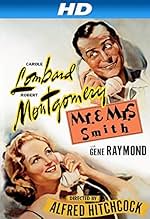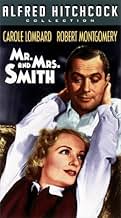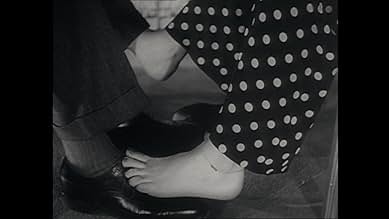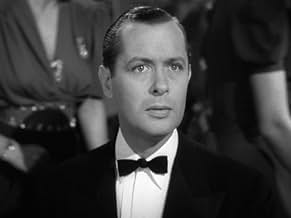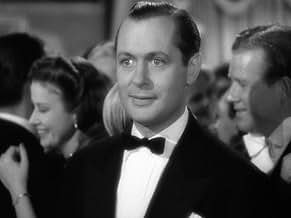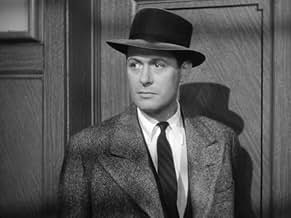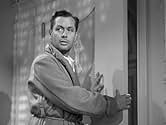NOTE IMDb
6,3/10
12 k
MA NOTE
Un couple marié depuis trois ans est choqué d'apprendre que leur mariage n'est pas valable juridiquement.Un couple marié depuis trois ans est choqué d'apprendre que leur mariage n'est pas valable juridiquement.Un couple marié depuis trois ans est choqué d'apprendre que leur mariage n'est pas valable juridiquement.
- Réalisation
- Scénario
- Casting principal
Pamela Blake
- Lily
- (as Adele Pearce)
Ernie Adams
- Bellhop
- (non crédité)
Ernie Alexander
- Bellhop at Lodge
- (non crédité)
Murray Alper
- Harold - Taxi Driver
- (non crédité)
Tex Brodus
- Nightclub Patron
- (non crédité)
Avis à la une
This is a good example of a movie that could be quite disappointing for anyone who had too many or too specific expectations for it. It's an Alfred Hitchcock movie, but it's not at all like any of his better-known films. The offbeat premise leads you to expect a 1930s-style screwball comedy, but instead it has a different brand of humor altogether.
The tone of the film blends together the screwball plot idea with Hitchcock's dry sense of humor and the upbeat charm of Carole Lombard. It's something of an odd combination, but it works all right as long as you don't have too many preconceptions.
Lombard and Robert Montgomery work well as "Mr. & Mrs. Smith", who find out at the beginning of the movie that they are not really married. Most of the story that follows moves at a decent pace, and although there are never any big laughs, there is some good material. It never really hits high gear, but once you get used to the pace, most of it works well enough.
It does slow down quite a bit towards the end, as things run out of steam, and this keeps the movie from being better. A grand climax in the screwball tradition might have made it a very good movie. Instead, as it is, "Mr. & Mrs. Smith" is a pleasant, generally amusing, slightly above-average romantic comedy.
The tone of the film blends together the screwball plot idea with Hitchcock's dry sense of humor and the upbeat charm of Carole Lombard. It's something of an odd combination, but it works all right as long as you don't have too many preconceptions.
Lombard and Robert Montgomery work well as "Mr. & Mrs. Smith", who find out at the beginning of the movie that they are not really married. Most of the story that follows moves at a decent pace, and although there are never any big laughs, there is some good material. It never really hits high gear, but once you get used to the pace, most of it works well enough.
It does slow down quite a bit towards the end, as things run out of steam, and this keeps the movie from being better. A grand climax in the screwball tradition might have made it a very good movie. Instead, as it is, "Mr. & Mrs. Smith" is a pleasant, generally amusing, slightly above-average romantic comedy.
The most surprising entry from the filmography of Alfred Hitchcock is his 1941 film, Mr. & Mrs. Smith. Hitchcock claimed he made the film as a favor to lead actress Carole Lombard; Mr. & Mrs. Smith is the only screwball comedy the famous suspense director ever made. Starring along with Carole Lombard is Robert Montgomery; the pair plays a married couple who find out that their marriage is unofficial, and instead of going through the legal paperwork to make their union legal, they question each other and their feelings. Out of his element, Hitchcock put forth a classic comedy that oddly still feels like a Hitchcock film, a true treat for the serious fan as they wade through Hitch's body of work.
Elite New York couple Ann Smith (Carole Lombard) and David Smith (Robert Montgomery) have enjoyed an affectionate, loving, wedded bliss for three years. After individual visits from their lawyers, however, they learn that a municipal technicality prevented their union from being legally recognized. What should be a simple fix, turns into a possible breakup for the couple as they start to wonder how much in love with each other they truly are. The day the couple was told of the technicality, David commented over breakfast that if he were to start his life over, he would never marry. Despite his love for his wife, David feels as though an immense amount of sacrifice of himself has taken place due to his marriage to his wife. That comment has stuck with Ann as she decides what to do about her defunct marriage to her husband. Ann decides that a separation is in order and she begins to live the life of a single woman, even re-adopting her maiden name. As Ann enjoys her new life and freedoms, David sets his sights to stop at nothing to win back the devotion of his wife. Winning back Ann's hand becomes much more difficult as she begins dating other men. As David becomes increasingly more disgruntled with life without his wife, he begins to realize that maybe he wouldn't remove his wife from his life if he had the chance to do it again.
As a fan of classic cinema, I was both surprised and embarrassed to realize that this was the first film I had seen of classic star Carole Lombard. I was happy to change that status and finally see her of a film; I found Lombard's acting exceptional and engaging, and cannot wait to see more of her work. This film is a lot of fun with the slight nods to silent cinema it seems to employ. The ways in which Mr. & Mrs. Smith plays out like a silent film, prove to be a perfect match to the plot of men's and women's relationships of the 1940's. As Lombard gains independence, she enjoys life without her husband more, therefore illustrating the liberation of women in the 40's. Although Mr. & Mrs. Smith has a very Howard Hawks feel to it, it is also clear that there are many aspects recognizable as Hitchcock touches. For instance, this journey through Alfred Hitchcock's filmography, I have grown quite fond of the way in which the auteur films faces. That same unique way faces are filmed are present in this film and are fun to watch. Sure, the film is a comedy, therefore Hitchcock touches are few and far between, but the film doesn't feel foreign to fans of Hitchcock and one can see his touches in it throughout the film. Fans of Hitchcock must see this film, if for no other reason, just to see the famous suspense director trying his hand at comedy; although, if given a chance, one won't be disappointed with a Carole Lombard film, either.
Elite New York couple Ann Smith (Carole Lombard) and David Smith (Robert Montgomery) have enjoyed an affectionate, loving, wedded bliss for three years. After individual visits from their lawyers, however, they learn that a municipal technicality prevented their union from being legally recognized. What should be a simple fix, turns into a possible breakup for the couple as they start to wonder how much in love with each other they truly are. The day the couple was told of the technicality, David commented over breakfast that if he were to start his life over, he would never marry. Despite his love for his wife, David feels as though an immense amount of sacrifice of himself has taken place due to his marriage to his wife. That comment has stuck with Ann as she decides what to do about her defunct marriage to her husband. Ann decides that a separation is in order and she begins to live the life of a single woman, even re-adopting her maiden name. As Ann enjoys her new life and freedoms, David sets his sights to stop at nothing to win back the devotion of his wife. Winning back Ann's hand becomes much more difficult as she begins dating other men. As David becomes increasingly more disgruntled with life without his wife, he begins to realize that maybe he wouldn't remove his wife from his life if he had the chance to do it again.
As a fan of classic cinema, I was both surprised and embarrassed to realize that this was the first film I had seen of classic star Carole Lombard. I was happy to change that status and finally see her of a film; I found Lombard's acting exceptional and engaging, and cannot wait to see more of her work. This film is a lot of fun with the slight nods to silent cinema it seems to employ. The ways in which Mr. & Mrs. Smith plays out like a silent film, prove to be a perfect match to the plot of men's and women's relationships of the 1940's. As Lombard gains independence, she enjoys life without her husband more, therefore illustrating the liberation of women in the 40's. Although Mr. & Mrs. Smith has a very Howard Hawks feel to it, it is also clear that there are many aspects recognizable as Hitchcock touches. For instance, this journey through Alfred Hitchcock's filmography, I have grown quite fond of the way in which the auteur films faces. That same unique way faces are filmed are present in this film and are fun to watch. Sure, the film is a comedy, therefore Hitchcock touches are few and far between, but the film doesn't feel foreign to fans of Hitchcock and one can see his touches in it throughout the film. Fans of Hitchcock must see this film, if for no other reason, just to see the famous suspense director trying his hand at comedy; although, if given a chance, one won't be disappointed with a Carole Lombard film, either.
Mr. Surif was wrong when he calls this Hitch's only venture into comedy, for "The Trouble With Harry" falls into that category as well. Not having seen all of Hitch's films, there could be others, for all I know.
Unlike "Harry", in which the peripatetic corpse gives the otherwise bucolic goings-on a zanily ghoulish air, "Mr. & Mrs. Smith" is an exercise in pure romantic comedy. Montgomery and Lombard work beautifully against each other, and the script is elegantly and effervescently witty. The opening scene, in which Hitchcock suggests the aftermath of a protracted and clearly energetic sexual romp, is surprisingly risque for its time, and far more erotically suggestive than some of the blatant stuff we see nowadays.
My only quibble is what I feel to be a rather unsatisfactory and hasty conclusion.
Unlike "Harry", in which the peripatetic corpse gives the otherwise bucolic goings-on a zanily ghoulish air, "Mr. & Mrs. Smith" is an exercise in pure romantic comedy. Montgomery and Lombard work beautifully against each other, and the script is elegantly and effervescently witty. The opening scene, in which Hitchcock suggests the aftermath of a protracted and clearly energetic sexual romp, is surprisingly risque for its time, and far more erotically suggestive than some of the blatant stuff we see nowadays.
My only quibble is what I feel to be a rather unsatisfactory and hasty conclusion.
According to the Films of Alfred Hitchcock, Carole Lombard prevailed upon Alfred Hitchcock to direct one her comedy films as a favor. Since Hitchcock admired her talent he did so.
It's important to remember that this is a Carole Lombard film and view it that way. Viewed as such it's not a bad marital comedy though if one is expecting certain Hitchcock touches they won't be there.
Robert Montgomery and Carole Lombard are a constantly spatting married couple. They love each other, but to them arguing is like exercise. In a moment of oneupsmanship Montgomery answers in the affirmative to a question by Lombard as to whether he'd marry her if he had to do it all over again.
His words come back to haunt him when Charles Halton from Lombard's hometown in Idaho and says that because of a technicality they're not legally married. Montgomery spends the rest of the film trying to win Lombard back.
Some of the best movie comedies have been made on a premise flimsier than this one. Mr.&Mrs. Smith is not the best of comedies, but it is far from the worst.
I have a feeling that Alfred Hitchcock may have had Lombard in mind for future projects more of his own taste. I can see her easily in some of his later films. Lombard was only 32 when she died.
Pity we'll never know.
It's important to remember that this is a Carole Lombard film and view it that way. Viewed as such it's not a bad marital comedy though if one is expecting certain Hitchcock touches they won't be there.
Robert Montgomery and Carole Lombard are a constantly spatting married couple. They love each other, but to them arguing is like exercise. In a moment of oneupsmanship Montgomery answers in the affirmative to a question by Lombard as to whether he'd marry her if he had to do it all over again.
His words come back to haunt him when Charles Halton from Lombard's hometown in Idaho and says that because of a technicality they're not legally married. Montgomery spends the rest of the film trying to win Lombard back.
Some of the best movie comedies have been made on a premise flimsier than this one. Mr.&Mrs. Smith is not the best of comedies, but it is far from the worst.
I have a feeling that Alfred Hitchcock may have had Lombard in mind for future projects more of his own taste. I can see her easily in some of his later films. Lombard was only 32 when she died.
Pity we'll never know.
When I put this movie on I was drowsy, and depressed. It did two things for me after I put it on. It kept me awake, thus entertaining me, and it put a smile on my face.
There are some genuine laughs in this movie, and the comedy is spread between all the characters. Robert Montgomery is extremely funny, with both excellent physical comedy, and great comedic timing with his dialogue. What surprised me most was the excellent comedic timing of Carole Lombard. She is extremely funny, but her chemistry with Montgomery in their scenes together is fantastic.
The direction, of course, is excellent. Not standard Hitchcock suspense, but classic Hitchcock comedy and romance, elements of his film making that a lot of people overlook.
Honestly, this is a fun movie. The humor is intelligent and never sinks to an infantile level. I had never heard of this movie until about two days ago, and I watched it and I was pleasantly surprised. 8 out of 10.
There are some genuine laughs in this movie, and the comedy is spread between all the characters. Robert Montgomery is extremely funny, with both excellent physical comedy, and great comedic timing with his dialogue. What surprised me most was the excellent comedic timing of Carole Lombard. She is extremely funny, but her chemistry with Montgomery in their scenes together is fantastic.
The direction, of course, is excellent. Not standard Hitchcock suspense, but classic Hitchcock comedy and romance, elements of his film making that a lot of people overlook.
Honestly, this is a fun movie. The humor is intelligent and never sinks to an infantile level. I had never heard of this movie until about two days ago, and I watched it and I was pleasantly surprised. 8 out of 10.
Le saviez-vous
- AnecdotesCarole Lombard directed Sir Alfred Hitchcock's cameo and made him do repeated takes.
- GaffesBecause the Smiths entered into the marriage in good faith and were unaware at the time that the marriage was invalid, their marriage is, in fact, still legal under American law.
- ConnexionsFeatured in Crimes et délits (1989)
- Bandes originalesThe Sidewalks of New York
(1894) (uncredited)
Music by Charles Lawlor
In the score during scenes at Mamma Lucy's
Meilleurs choix
Connectez-vous pour évaluer et suivre la liste de favoris afin de recevoir des recommandations personnalisées
Détails
- Date de sortie
- Pays d’origine
- Langue
- Aussi connu sous le nom de
- Mr. & Mrs. Smith
- Lieux de tournage
- Société de production
- Voir plus de crédits d'entreprise sur IMDbPro
- Durée1 heure 35 minutes
- Couleur
- Rapport de forme
- 1.37 : 1
Contribuer à cette page
Suggérer une modification ou ajouter du contenu manquant




